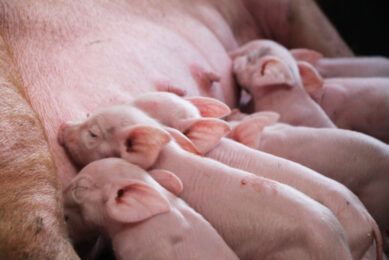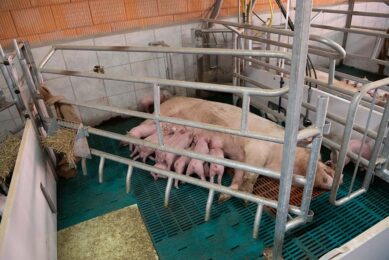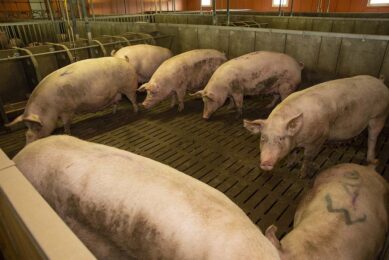Enough Colostral Energy?
I continue my aim during the present feed price crisis of only writing about actions you can take which do not involve any additional expense at all – apart from more attention to detail. One such is in the area of colostrum.
I continue my aim during the present feed price crisis of only writing about actions you can take which do not involve any additional expense at all – apart from more attention to detail. One such is in the area of colostrum.
Information taken from the records of some 60 breeder clients visited over the past five years clearly shows how much bigger their litters are these days. 13s are as common as 10s were only 8 years ago. This success, while welcome, also has two downsides to it.
- A litter of 13 takes about 20 to 30 minutes longer to deliver than one of 10, and the last three almost certainly exhausted neonates to be expelled are very vulnerable. So anything which can speed up farrowing time is valuable. A new product `Parturaid` looks to be very useful in this respect. Have a look at it.
- Studying the records from 14 clients’ farms who have always believed in weighing piglets at birth also suggests that their birthweights are more variable these days and that losses to weaning are up by half a pig at least (with some as many as two) despite three more being expelled. This seems to be mainly due to those tail-enders. One authority suggests that birthweight reduces by 32 to 40g for each extra pig in the litter over 11.
Both these drawbacks can be counterbalanced by the stockperson being there at farrowing.to ensure sufficient colostrum is consumed by every piglet in those first vital few suckling episodes. What we need to take on board is that colostral energy is just as important as immunoglobulin adequacy.
Here are a few observations gathered from the literature.
•The importance of the immunoglobulins in colostrum is well-known, but what is less appreciated by farm workers is the very high digestible energy content of colostrum to suit a` brand-new` absorbtive gut surface which is completely immature. Thus the retention of energy by the newborn is much higher than from later sow`s milk
• The newborn piglet needs 1000 kilojoules of energy per kg of bodyweight.
• Under research conditions, the work has shown that newborns allowed ample access to the udder will consume 250 g colostrum/ kg body weight, a comfortably safe level of intake. However under the more rigorous conditions of a typical farm, intake maybe much closer to the critical threshold of 150 to 170 g/kg. bodyweight to ensure survival. Each 100 g less body weight could decrease colostrum intake by 30 grams, according to French work.
• Moreover, with unsupervised litters at farrowing, the heavier and earlier-born piglets are likely to get a disproportionate share of colostrum and the smaller and later arrivals suffer not only a reduction of immunoglobulins, but also not enough immediately-available energy. This energy intake deficit could increase neonatal mortality in the later arrivals which are already anoxic or hypoxic, and are thus cold and weak, both immediately rectified by a quick suckle or two of colostrum.
This is why it pays to be there at farrowing and for the carer to `catch` these vulnerable neonates and to use the various well-known methods of attention to defend them. It worries me a bit that on many of the farms I visit, they are not yet using batch-farrowing and prostaglandins – which make being present at nearly all farrowings so much easier.
Three more pigs per litter these days – great! But to lose two of them so early on is wasteful and largely needless.











